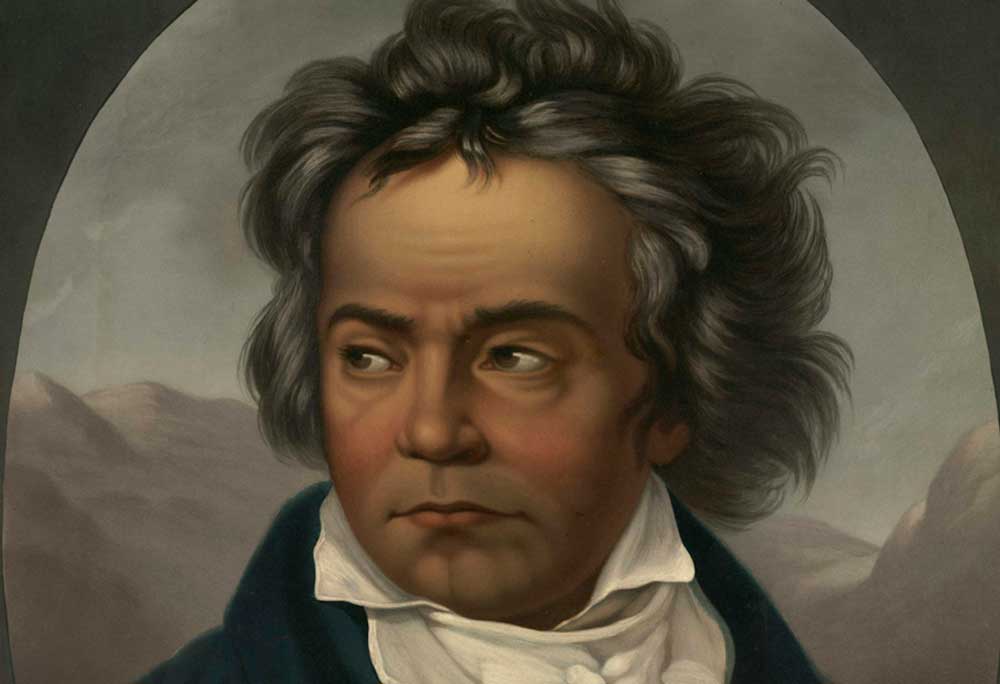
By Ted Olson
In early 1824, 30 members of Vienna’s music community sent a letter to Ludwig van Beethoven petitioning the great composer to reconsider his plans to premiere his latest work in Berlin and instead debut the symphony in Vienna.
Beethoven had lived in Vienna since 1792, when he left his hometown of Bonn, Germany, to pursue a career as a composer. Beethoven rose to world renown, but by the 1820s he had fallen out of favor with Viennese arts patrons who, at the time, were drawn to the sounds and styles of Italian composers.
Beethoven had not appeared before a Viennese audience in a dozen years, but he was moved by the letter’s sentiment and agreed to debut his new work, Symphony No. 9 in D minor, in the city. The premiere performance was on May 7, 1824, at Kärntnertor Theater.
Concert promoters promised the public that the legendary – and legendarily antisocial – composer would be present at the performance of his latest symphony. Indeed, during the entirety of the performance, he was on stage, his back to the audience, as described by Maynard Solomon in his acclaimed biography of Beethoven.

DEA/A. DAGLI ORTI/De Agostini via Getty Images
The composer insisted upon conducting the symphony from a conductor’s stand. The official conductor at the concert, Michael Umlauf, had instructed the musicians – a Viennese orchestra and choir – to ignore Beethoven, who was completely deaf and who theoretically could not be relied upon to keep time.
The performance was interrupted several times by rapturous applause from the approximately 2,000 attendees, but Beethoven could not hear the reaction. According to eyewitnesses, the composer “threw himself back and forth like a madman” and fell several bars behind in his “conducting.”
The enthusiastic response to the symphony’s debut performance presaged its reception in the European music community, globally and across time.
Global appeal
Symphony No. 9, sometimes referred to as the Choral Symphony, was the capstone to Beethoven’s extraordinary career. In the 200 years since its debut, the symphony has become an essential composition in the orchestral repertoire and is often cited as the crowning achievement of Western classical music.
A central reason for the symphony’s accessibility to a broad audience was Beethoven’s incorporation of the 1785 poem “An die Freude,” or “Ode to Joy,” by Friedrich Schiller, a leading German author, historian and philosopher. Matched to a memorable melody in the fourth movement, this text – with its uplifting, humanitarian sentiment – contributed to the symphony’s character as an anthem.
Widely interpreted as Beethoven’s plea for a global “brotherhood,” the fourth movement has been incorporated into ceremonial events sponsored by international organizations such as UNESCO, the Olympics, the Council of Europe and the European Union. Given the work’s fame the Ode to Joy section of the symphony has also been appropriated for propaganda by supporters of Nazism, Bolshevism, Maoism and other ideologies.
Groundbreaking composition
Symphony No. 9 is extraordinary in many ways, according to Teddy Abrams, music director of the Louisville Orchestra and a Grammy Award-winning conductor.
The Ninth Symphony was not the first long piece of music at the time, but the others were generally built by stringing together many shorter sequences. In contrast, Beethoven crafted the Ninth Symphony – a 74-minute work – out of just four long movements. “The proportions alone are staggering,” Abrams said in an interview for this article.
Each of the Ninth’s four movements is a single cohesive, coherent musical statement. This, more than the innovation of using a chorus in a symphony, was what made Beethoven’s Ninth revolutionary, according to Abrams.
At the beginning of the last movement, Beethoven reprised elements of the previous three movements. This “quoting” was a highly unusual technique at the time, according Abrams. “It is from these musical ‘memories’ that the timeless Ode to Joy theme emerges,” he said.
Energy and drive
The symphony has influenced artists across the cultural spectrum, including various modern and avant-garde music genres. British composer Gabriel Prokofiev, grandson of famed Russian composer Sergei Prokofiev, was commissioned by a French orchestra in 2011 to create a new work, Beethoven9 Symphonic Remix, that interpreted the symphony through a fusion of classical and electronic music.
When interviewed for the 2020 documentary film “Beethoven’s Ninth: Symphony for the World,” Prokofiev commented: “A lot of the techniques and approaches [Beethoven] used, particularly his climactic finales and his codas and the drama and the sense of energy and drive he had, we find that everywhere, especially in dance music and electronic music.”
For over a century, Symphony No. 9 has played an iconic role within the recording industry. Given the ongoing popularity of Beethoven’s work, record companies since 1923 have sought to release commercial recordings of this particular symphony. Early records couldn’t fit the entirety of the symphony, however.
Then, around 1980, two record companies – Sony and Philips – negotiated the length of the new digital compact disc format at just over 74 minutes per CD. According to Joop Sinjou, a Philips engineer who played a key role in developing the technology, Sony Chairman Akiyo Morita and his wife insisted that the new format be designed to fit the full Symphony No. 9. However, there are variations of the story, so it’s not certain that the companies’ decision to make CDs capable of holding more than an hour of music was specifically to accommodate Beethoven’s Ninth.
Goodwill symphony
Embedded in the symphony’s fourth movement is a message for peace with particular resonance in the 21st century. In one section of that movement, Beethoven incorporated a “Turkish March” featuring two instruments associated with Turkey: the cymbal and bass drum. According to Prokofiev, during Beethoven’s era Europeans discriminated against Turks.
Beethoven’s Symphony No. 9 was performed in 2006 by the West-Eastern Divan Orchestra, an ensemble that consisted of young Israeli and Arab musicians. The performance was part of a campaign for a peaceful resolution to the Middle East conflict.
YouTube videos of this performance have been viewed by millions. The aspiration of Beethoven’s “goodwill” symphony continues to inspire a vision of a united humanity.
![]()
Ted Olson is Professor of Appalachian Studies and Bluegrass, Old-Time and Roots Music Studies at East Tennessee State University.





























Pogo says
@Can you hear me now?
Arthur Herm says
Magnificent ! Thank you !